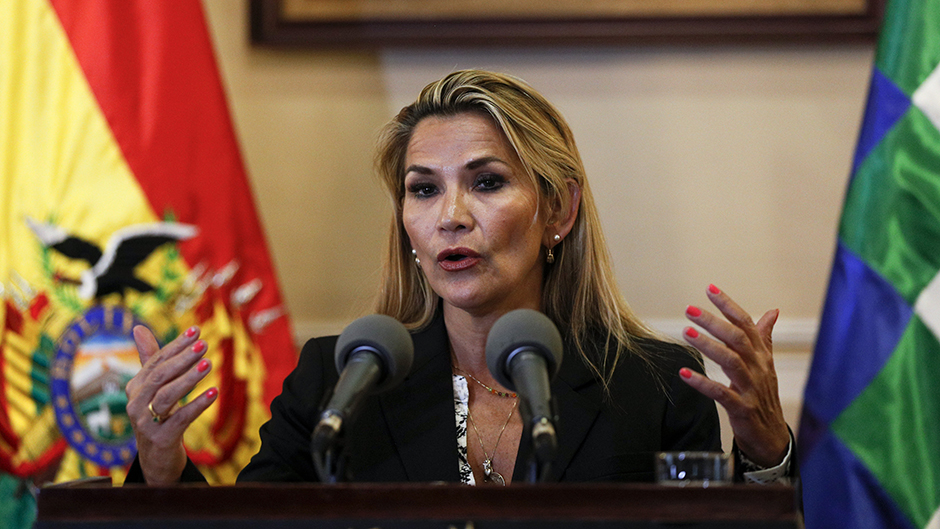Calla Hummel, an assistant professor in the University of Miami’s Department of Political Science who began visiting Bolivia after Evo Morales’ election as the first indigenous president 14 years ago, had front row seats—and a personally unnerving but false connection—to the turmoil that sparked Morales’ resignation on Sunday, 17 days after he declared himself winner of a controversial fourth term.
 Hummel, an expert on Bolivia’s street vendors who make up a majority of the workforce in Latin America’s poorest country, was selling buñuelos, a sweet fritter, a block from the presidential residence in the capital of La Paz just hours before the vote count abruptly stopped on the evening of Oct. 20.
Hummel, an expert on Bolivia’s street vendors who make up a majority of the workforce in Latin America’s poorest country, was selling buñuelos, a sweet fritter, a block from the presidential residence in the capital of La Paz just hours before the vote count abruptly stopped on the evening of Oct. 20.
The next day, when the count resumed, the tally showed Morales had surged ahead toward the 10-point margin he needed to avoid a runoff against his challenger, former President Carlos Mesa. Describing the shift as “drastic and inexplicable,” the Organization of American States (OAS) called for a runoff regardless of the tally, but Morales held fast, setting off a wave of often-violent protests, police mutinies, and an OAS election audit that found irregularities and manipulations of the voting system.
Morales eventually heeded the call for new elections, but on Nov. 10, after Bolivia’s military and trade federations withdrew their support, Latin America’s longest, continuously serving president resigned, describing his ouster as a coup, a refrain echoed by his allies in Mexico, Cuba, and Nicaragua. His vice president and all of his constitutionally designated successors also resigned, prompting the constitutional tribunal to certify the second vice president of the Senate as head of state until elections could be held, which the Bolivian constitution calls for in 90 days.
Hummel, who was in Bolivia researching a book on how and why street vendors unionize, in part with a grant from the University of Miami Institute for Advanced Study of the Americas, began posting videos and photos on Facebook and Twitter of the increasingly violent protests she could see from her apartment near the electoral tribunal. Her goal, she said, was to keep “a primarily academic audience” that didn’t “know which Bolivian press accounts to follow” informed about the rapidly unfolding events.
Her skepticism about the Bolivian press would prove warranted when on Oct. 29 she learned that two state-controlled media outlets had published news stories, accompanied by her photo, falsely claiming she was an agent of the U.S. and organizing the protests. Hummel, who recounted what she called that “bizarre experience” to Inside Higher Ed, presumes she was an easy target for the “ridiculous” accusations because she was commenting on social media in English. She quickly left Bolivia for her own safety, but hopes to return next year to teach at La Paz’s main university.
Here she answers five questions about the situation in Bolivia.
Was Evo Morales’ departure a coup, and does it hold any lessons for other strongman governments like Venezuela?
No, it was not a coup. A coup is when the military or another group takes over. His departure left a power vacuum. There was no president for 48 hours. Everyone fled power, and there was no organized group to immediately take power. Since the president suddenly resigned, as did his vice president, top legislative leaders, his ministers, the next in the line of succession was Jeanine Añez, second vice president of the Senate, who is now the interim president. She is forming alliances to calm the protests and organize new elections. But she is a wild card, and it’s not clear if she can fill the power vacuum. She comes from a small opposition party and does not have a large team or reputation. Once that gets sorted out, we’ll see what the implications are for the region. As for Venezuela, these are very different conditions and pretty different countries, even if there are some similarities and alliances between their governments. One of the hopeful things that we saw here is that, under pressure from a lot of different sectors of society, Morales stepped down amid electoral fraud allegations, instead of attempting to hold on to power through dictatorship the way that Nicolás Maduro and his predecessor, Hugo Chavez, have.
Bolivia has a history of abrupt presidential resignations, amid violent protests. Is it a democracy?
That’s one of the big questions we have going forward. The last three weeks and the elections looked like a slide into competitive authoritarianism, where we have a ruling party that holds elections but they aren’t really competitive. Morales’ resignation, after escalating protests, is potentially a step towards competitive democracy again. However, it really depends what happens with this interim president and the next election. If we have another populist leader emerge from the right, or if Morales tries to make a comeback, then it’s very easy to slide toward competitive authoritarianism or outright authoritarianism again. If the military steps in, that’s a clear move towards authoritarianism, although that looks unlikely. However, we may actually have competitive elections where we have a new democratically elected candidate, which would be a hopeful sign.
Does that mean there would be a slate of new candidates, or the same candidates who ran before, presumably minus Morales?
It’s not clear if there will be new candidates. It’s not clear if there will be primaries. The only thing that is clear is that Jeanine Añez has 90 days to hold elections. It’s also unclear how many of the problems that the Organization of American States found will be fixed before the new elections. In addition to fraud, there were a lot of systemic problems that I highly doubt can be fixed in 90 days. The biggest problem was when the vote count resumed after being interrupted, the information came from an unregistered server. So that means the security system for the servers is not very secure; it’s easy for other servers to enter the system; and it’s relatively easy for the system to be hacked. There is also no way to store individual votes for a full recount. All of those things make it difficult to fix a large electoral system in 90 days because you need to bring in new technology and new people, and then you need to train everybody on it and test it to make sure it is not as vulnerable as the previous system.
What are the chances Morales would attempt a comeback?
In the context that he and so many senators, governors, ministers, and others associated with him resigned, I say he’s out for the time being. But the opposition is united only because he was a common enemy. So now that he’s gone it’s likely the opposition will fragment. If he stages a comeback it will likely be after they fragment and fall to infighting again. But let me share this story about street vendors. In 1946, there was a highly unpopular president in a highly polarized Bolivia named Gualberto Villarroel and, amid protests for him to resign, organized street vendors stormed the presidential palace, killed him, and hung his body in the central square. So there are some very serious precedents for wanting to leave power and for being wary of protestors who are going around with explosives and burning buildings.
What do you think Bolivia’s future looks like without Morales?
That’s a big question. The entire time I’ve worked in Bolivia, Morales has been president, so I don’t know what a post-Morales Bolivia will look like and neither do a lot of voters. Members of the opposition are definitely hopeful, but a lot of people are scared. Almost everyone I know in Bolivia and out of Bolivia, including academics, initially supported Morales because he came to power with the support of all of these social movements and sectors. He promised huge change after a particularly tumultuous time in Bolivian politics, where they went through a rapid succession of presidents. He provided the hope that things would stabilize, that people would be included, that there would be more participation and opportunity, which happened to some degree. Extreme poverty definitely went down significantly. Lots of people have more money and opportunity than they did when he took office. For many, life was better, which is part of the tragedy of what is happening now.

